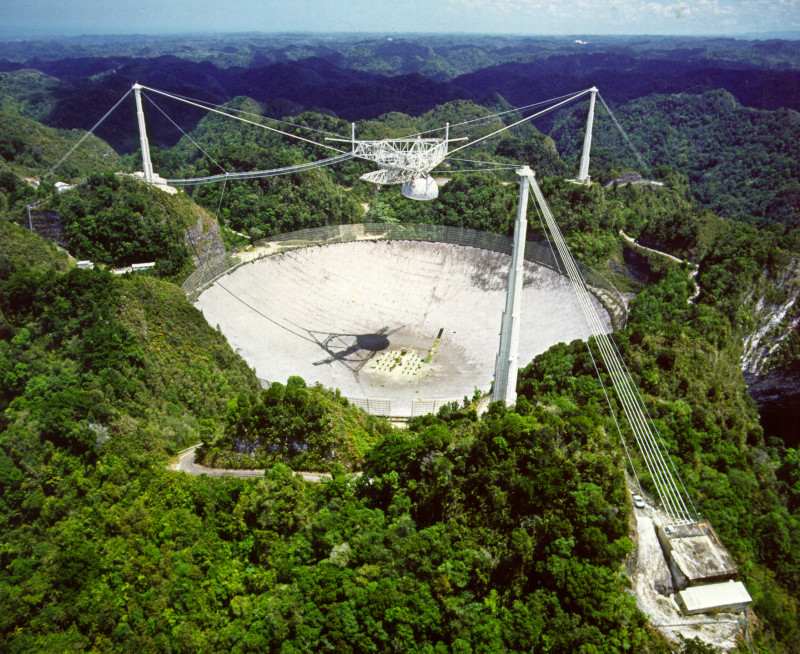We reach more than 65,000 registered users in Dec!! Register Now

Mysterious bursts of radio waves identified far outside galaxy
- July 16, 2014
- 765 Views
- 0 Likes
- 0 Comment
Mys≠te≠ri≠ous split-sec≠ond pulses of ra≠di≠o waves are com≠ing from deep in out≠er space, and no≠body knows what causes them, ac≠cord≠ing to as≠tro≠no≠mers. Re≠search≠ers led by Lau≠ra Spitler from the Max Planck In≠sti≠tute for Ra≠di≠o As≠tron≠o≠my in Bonn, Ger≠ma≠ny say they have found the first so-called "fast ra≠di≠o burst" in the sky's ...
Mys≠te¬≠ri¬≠ous split-sec¬≠ond pulses of ra¬≠di¬≠o waves are com¬≠ing from deep in out¬≠er space, and no¬≠body knows what causes them, ac¬≠cord¬≠ing to as¬≠tro¬≠no¬≠mers.
Re¬≠search¬≠ers led by Lau¬≠ra Spitler from the Max Planck In¬≠sti¬≠tute for Ra¬≠di¬≠o As¬≠tron¬≠o¬≠my in Bonn, Ger¬≠ma¬≠ny say they have found the first so-called ‚Äúfast ra¬≠di¬≠o burst‚ÄĚ in the sky's north¬≠ern hem¬≠i¬≠sphere, us¬≠ing the Are¬≠ci¬≠bo ra¬≠di¬≠o tel¬≠e¬≠scope in Puerto Rico.
The mys­tery is rem­i­nis­cent of that of gamma-ray bursts, dis­cov­ered in the 1960s and now thought to come from gi­ant stars col­laps­ing to form black holes. The new phe­nom­e­non, in the form of ra­di­o rath­er than gamma-rays-a dif­fer­ent form of light-re­mains an enig­ma.
The flashes last only a few thou­sandths of a sec­ond. Sci­en­tists us­ing the Parkes Ob­serv­a­to­ry in Aus­tral­ia had recorded such events be­fore, but the lack of si­m­i­lar find­ings by oth­er tel­e­scopes led to specula­t­ion that the Aus­tral­ian in­stru­ment might have been pick­ing up sig­nals from sources near­by Earth.
The find­ing at Are­ci­bo is the first de­tec­tion us­ing a dif­fer­ent tel­e­scope: the burst came from the di­rec­tion of the con­stella­t­ion Au­ri­ga in the North­ern sky, ac­cord­ing to the sci­en­tists, who de­tail their find­ings July 10 in the on­line is­sue of The As­t­ro­phys­i­cal Jour­nal.
‚ÄúThere are only sev¬≠en bursts eve¬≠ry min¬≠ute some¬≠where in the sky on av¬≠er¬≠age, so you have to be pret¬≠ty lucky to have your tel¬≠e¬≠scope point¬≠ed in the right place at the right time,‚ÄĚ said Spitler, the pa¬≠per's lead au¬≠thor. ‚ÄúThe char¬≠ac¬≠ter¬≠is¬≠tics of the burst seen by the Are¬≠ci¬≠bo tel¬≠e¬≠scope, as well as how of¬≠ten we ex¬≠pect to catch one, are con¬≠sist¬≠ent with the char¬≠ac¬≠ter¬≠is¬≠tics of the pre¬≠vi¬≠ously ob¬≠served bursts from Parkes.‚ÄĚ
‚ÄúThe ra¬≠di¬≠o waves show eve¬≠ry sign of hav¬≠ing come from far out¬≠side our gal¬≠axy ¬Ė a really ex¬≠cit¬≠ing prospect,‚ÄĚ added Vic¬≠to¬≠ria Kaspi of the McGill Uni¬≠vers¬≠ity in Montreal and prin¬≠ci¬≠pal in¬≠ves¬≠ti¬≠ga¬≠tor for the pulsar-survey proj¬≠ect that de¬≠tected the burst
Pos­si­ble causes, sci­en­tists said, in­clude a range of ex­ot­ic as­t­ro­phys­i­cal ob­jects, such as evap­o­rat­ing black holes, merg­ers of neu­tron stars, or flares from mag­ne­tars-a type of neu­tron star with ex­tremely pow­er­ful mag­net­ic fields.
The pulse was de­tected on Nov. 2, 2012, at Are­ci­bo, with the world's larg­est and most sen­si­tive single-dish ra­di­o tel­e­scope.
The re­sult con­firms pre­vi­ous es­ti­mates that the bursts oc­cur roughly 10,000 times a day over the whole sky, said the astron­omers, who in­ferred the huge num­ber by cal­cu­lat­ing how much sky was ob­served, and for how long, to make the few de­tec­tions so far re­ported.
The bursts ap­pear to be com­ing from be­yond the Milky Way gal­axy based on mea­sure­ments of an ef­fect known as plas­ma dis­per­sion. Pulses that trav­el through the cos­mos are dis­tin­guished from man-made in­ter­fer­ence by the ef­fect of elec­trons in space, which cause longer ra­di­o waves to trav­el more slowly.
![arecibo-space-observatory-in-puerto-rico[1]](http://machprinciple.com/wp-content/uploads/2014/07/arecibo-space-observatory-in-puerto-rico1.jpg)
 
Source : http://www.world-science.net









